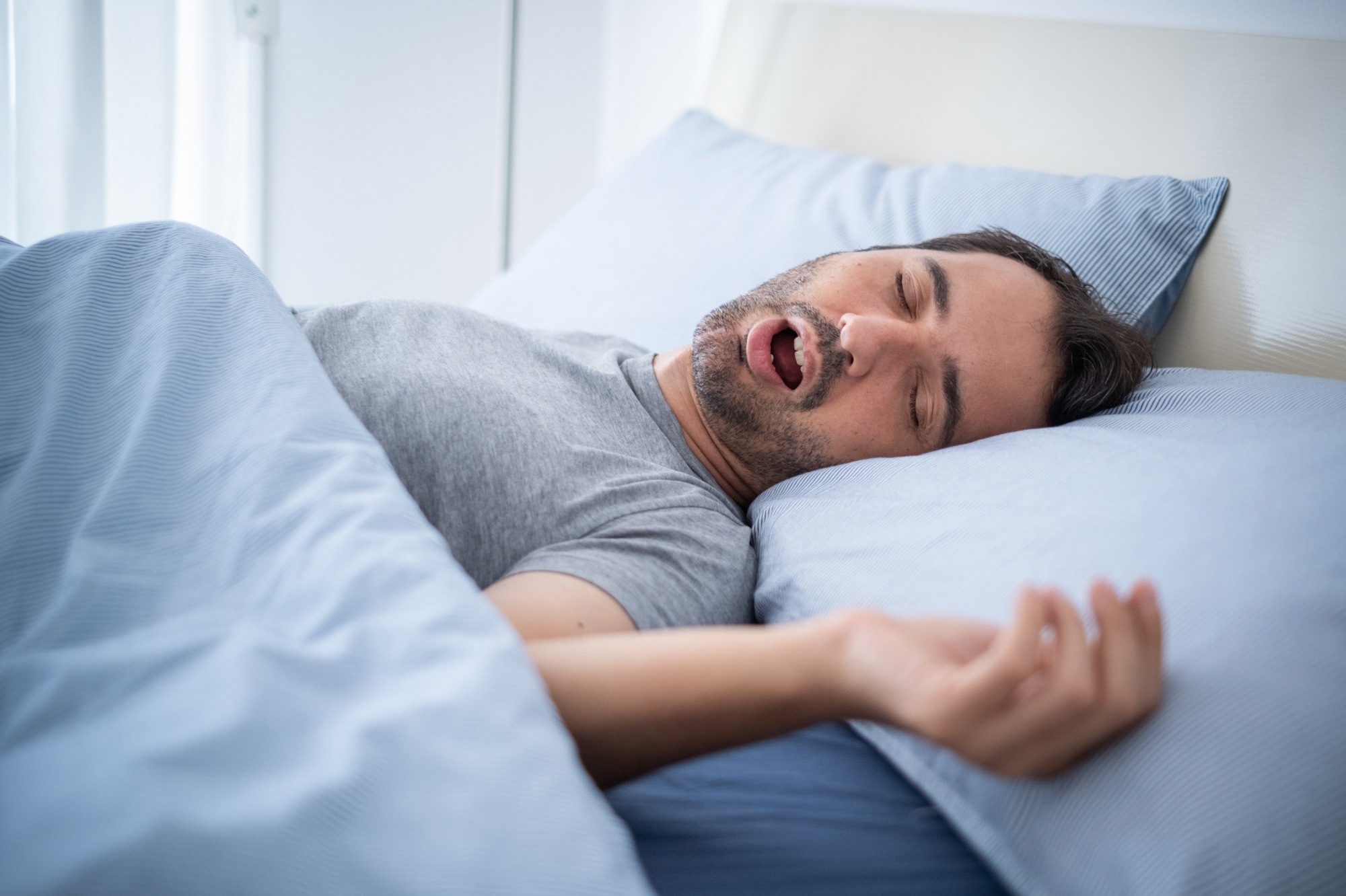For your doctor to solve. My doctor never tested me for snoring or asked my wife if I snored.
Study predicts snoring could increase the risk of stroke
In a recent study published in The Lancet Regional Health, researchers conducted a Mendelian randomization (MR) analysis to understand the causal effect of snoring on total stroke, hemorrhagic stroke (HS), and ischemic stroke (IS) among Chinese adults using data from the China Kadoorie Biobank (CKB).
 Study: Causal association between snoring and stroke: a Mendelian randomization study in a Chinese population. Image Credit: F01 PHOTO/Shutterstock.com
Study: Causal association between snoring and stroke: a Mendelian randomization study in a Chinese population. Image Credit: F01 PHOTO/Shutterstock.com
Background
MR studies have evaluated the association between snoring and stroke in the European population; however, this data for the Asian populations is scarce, partially due to the non-availability of genetic variants, as revealed by the extensive search done by researchers on PubMed and Google Scholar.
A few observational studies did estimate the relationship between snoring and stroke in people from different ancestries, but their findings were inconclusive.
Here, it is noteworthy that snoring may cause stroke via several pathways. For instance, it can cause anoxemia, resulting in oxidative stress responses and endothelial disturbance, which might lead to atherosclerosis and a stroke eventually.
Similarly, snoring might transmit a high-level vibration to the carotid artery, triggering a cascade effect on the arterial wall cells that might end in a ruptured vessel.
About the study
In the present study, based on single nucleotide polymorphisms (SNPs) from the genome-wide association analysis (GWAS) of snoring among CKB and UK Biobank participants, researchers constructed genetic risk scores (GRS).
They used this data for causal inference of snoring on stroke among Chinese adults aged 30–79 years living in ten study areas across China.
Multivariable MR (MVMR) included additional adjustments for the GRS of body mass index (BMI) and used SNPs from CKB, UKB, and Biobank Japan.
Participants in the study self-reported their snoring status in the baseline survey, with those reporting frequent or occasional snoring classified as snorers and others as non-snorers.
The three study outcomes were incident stroke, HS, and IS. The researchers confirmed the validity of the registry and insurance-based definition for stroke cases by reviewing medical records and achieving a 91.8% diagnosis confirmation rate.
During statistical analysis, the team used the Efron pseudo-R2 and F statistics to estimate the variance explained by GRS for snoring. Likewise, they used a two-stage method to determine the causal hazard ratio (HR), adjusting for multiple factors.
Furthermore, the team used MR with the inverse-variance weighted (IVW) method to examine the causal effect of snoring and stroke using three SNPs identified in the CKB GWAS as genetic instrumental variables (IVs) for snoring.
They tested for pleiotropy and heterogeneity via MR-Egger regression and Cochrane's Q tests. Sensitivity analysis excluded SNPs associated with adiposity.
Results and conclusion
The present MR analysis of snoring and stroke encompassed 82,339 unrelated participants of Asian descent in CKB with baseline and genotyping data.
During a median follow-up of 10.10 years, 19,623 developed strokes, with 11,483 IS cases and 5710 HS cases. The MR‒Egger regression test showed no horizontal pleiotropy (P>0.05), and Cochrane's Q test showed no heterogeneity (P>0.05).
The results confirmed a positive association between snoring and total stroke, as well as HS and IS, with the corresponding HRs (95% CIs) of 1.56, 1.50, and 2.02 using GRS of 100,626 CKB participants. Likewise, the corresponding HRs using the GRS of UKB were 1.78, 1.94, and 1.74.
Due to adiposity, i.e., fat deposition in the structures close to the upper airway or the tongue, snoring occurs. Accordingly, some studies have shown that oropharyngeal exercises and mandibular advancement devices can treat snoring.
In the present study, researchers conducted several sequential analyses to address the confounding bias introduced by adiposity.
Yet, they observed that these associations remained stable across the MVMR analysis, MR analysis using the IVW method, and MR among the non-obese group (BMI<24.0 kg/m2), suggesting that BMI pleiotropy did not affect the causal effect of snoring on stroke.
Thus, they concluded that snoring interventions targeting physical structure management could be more beneficial than weight management in preventing stroke.
Overall, this study found snoring as a potential causal factor for the increased risk of stroke and its subtypes among Chinese adults, which remained stable, independent of the effect of BMI, a well-established factor for stroke.
-
Yunqing Zhu, et al., (2024) Causal association between snoring and stroke: a Mendelian randomization study in a Chinese population, The Lancet Regional Health - Western Pacific., doi: https://doi.org/10. 1016/j.lanwpc.2023. 101001.https://www.thelancet.com/journals/lanwpc/article/PIIS2666-6065(23)00319-X/fulltext


No comments:
Post a Comment